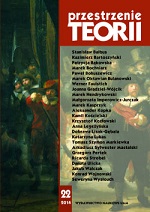„Uksiążkowienie” jako problem estetyczno- -medialny. Obcy – ósmy pasażer Nostromo – studium przypadku
”Novelization” as an aesthetic and media issue. Alien – a case study
Author(s): Werner Faulstich, Ricarda StrobelSubject(s): Media studies, Studies of Literature, Film / Cinema / Cinematography, Theory of Literature
Published by: Uniwersytet Adama Mickiewicza
Keywords: literature; movie; aesthetics; medium; means of expression;
Summary/Abstract: There is no literature (e.g. a novel, feature film) without a medium (e.g. a book, film), but one should be clearly differentiated from the other. Particular works can only be compared based on a comparison made between particular means of expression, i.e. media. A production-related and aesthetic approach, which has been regarded as unscientific for a long time, should be replaced by the much more appropriate media-related and aesthetic approach. Werner Faulstich and Ricarda Strobel’s reflections on the novelization of film refer to Ridley Scott’s picture titled Alien (1979), Richard J. Anobile’s movie novel (photonovel) which is based on Archie Goodwin and Walter Simonson’s comics as well as to Alan Dean Foster’s novelized screenplays. Moreover, references are also made to two popular-science books: Paul Scanlon and Michael Gross’s The Book of Alien (New York 1979) and H.R. Giger’s Giger’s Alien (Basel 1979), which are treated as “books written on the basis of a film”. The film Alien deals, in a disguised form, with the topic of a man’s fear of a woman as the one who gives birth. It describes the sequence of processes that occur in a woman’s body, from conception and pregnancy to birth, as seen by a man who is “on the outside”. A man perceives a woman’s reproductive capacity, which is unattainable to him, as something alien and disturbing.
Journal: Przestrzenie Teorii
- Issue Year: 2014
- Issue No: 22
- Page Range: 231-259
- Page Count: 29
- Language: Polish

